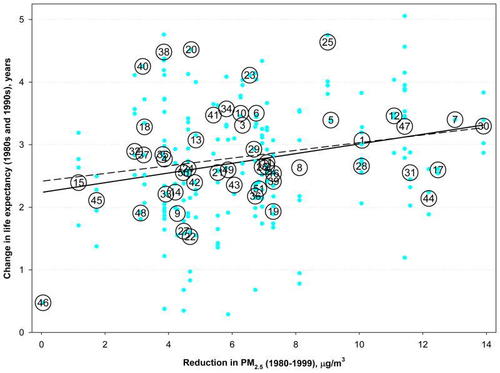Exposure to fine particulate matter air pollution has been associated with increased risk of cardiopulmonary and lung cancer morbidity and mortality, suggesting that sustained reductions in pollution exposure should result in improved life expectancy. This study directly evaluates changes in life expectancy associated with differential changes in fine particulate air pollution that occurred in the U.S. during the 1980s and 1990s.
A decrease of 10 μg/m3 of fine particulate concentration was associated with an estimated increase in life expectancy equal to 0.77 (SE = 0.17) years. The estimated effect of reduced pollution exposure on life expectancy was not highly sensitive to controlling for changes in socio-economic, demographic, and proxy smoking variables or to restricting observations to relatively large counties and central metro counties. The effect of reductions in air pollution on life expectancy in the study areas was as much as 18% of the overall increase.
Depending on which study you consult and whose models you believe, a decrease of 10μg/m^3 in PM2.5 (fine particulate air pollution) is associated with a increase in life expectancy of somewhere between 0.33-1.06 years.
Bad News: PM2.5 levels in the Bay Area are 50% above the national average of 10μg/m^3.
Good News: HEPA air filters ($46.24 on Amazon) can reduce indoor PM2.5 by 99.97%. Assuming you spend 50% of your time at home, the rough EV of purchasing a good home air filtering system is +0.58 years of life.
These kind of filters have also been shown to reduce allergies and improve sleep too — which is also a very nice and very immediate benefit of owning one as well.
See on www.ncbi.nlm.nih.gov
